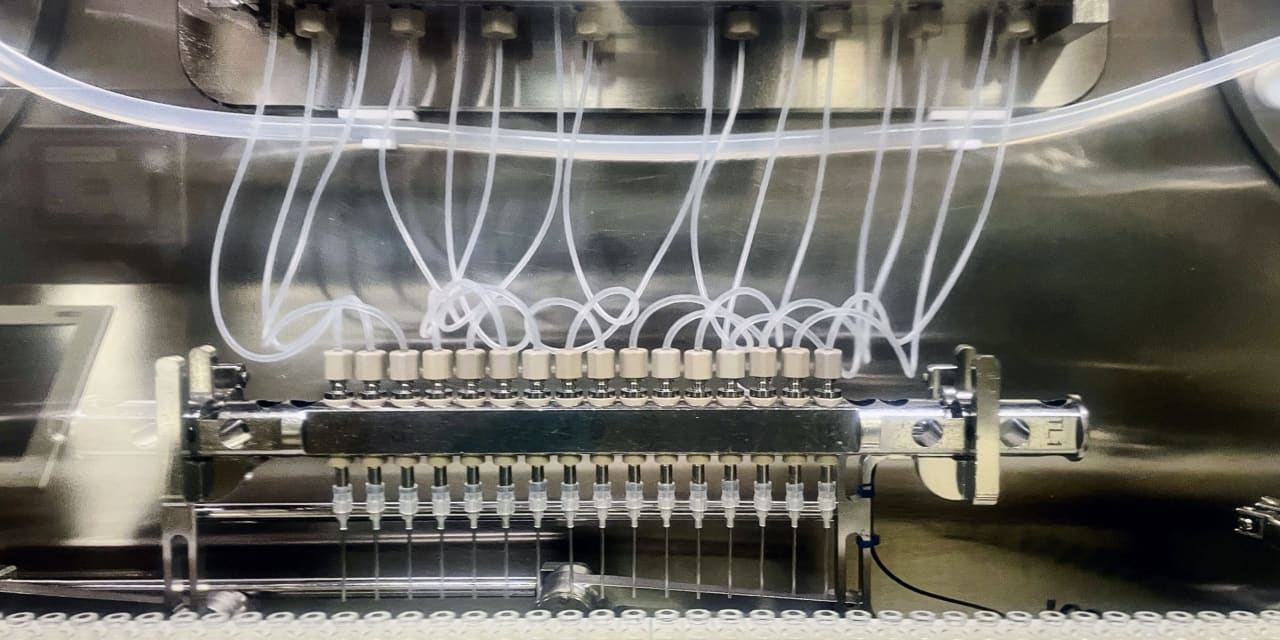The U.K.-based drugmaker
GSK’s
new respiratory syncytial virus vaccine hit blockbuster status in just four months, the company said Wednesday.
The strong debut for Arexvy, the new vaccine, is helping shift the trajectory of a drugmaker that has struggled to grow its earnings, and its stock price, for years.
The company on Wednesday significantly boosted its mid-term and long-term guidance. GSK now expects sales to grow by more than 7% on a compound annual growth rate basis from 2021 through 2026, up from its prior guidance of more than 5%.
It now expects risk-adjusted sales of more than £38 billion (about $48 billion) in 2031, up from an earlier estimate of £33 billion.
“We think it’s a very competitive outlook,” GSK CEO Emma Walmsley told Barron’s Wednesday morning. ”We’ve been working towards over the transformation of GSK over the last several years to deliver a step change in our operating performance.”
Earlier Wednesday morning, GSK reported fourth-quarter earnings of 28.9 pence per share, just short of the 29.04 pence consensus estimate, according to FactSet. Sales for the quarter were £8.1 billion, beating the FactSet consensus estimate of £7.6 billion.
Full-year sales for GSK were £30.3 billion in 2023, up 3% from 2022.
The company’s American depositary receipt jumped 3.5% Wednesday morning.
The sunnier long-term guidance represents a stark change from just three years ago, when Walmsley faced activist campaigns calling for her ouster. The CEO survived those efforts, and now helms a company with an enviable new vaccine and a strong outlook.
GSK said Arexvy sales for the fourth quarter were £504 million, well above analyst estimates. TD Cowen analyst Steve Scala wrote Wednesday morning that he had been expecting Arexvy sales of £200 million for the quarter.
Full-year sales of Arexvy were £1.2 billion ($1.5 billion). Pharma-watchers generally consider a drug to hit “blockbuster” status at $1 billion in annual revenue. Arexvy hit the U.S. market only in late August.
GSK is so far dominating the U.S. market for RSV vaccines, where it faces competition from
Pfizer’s
Abrysvo. GSK says 11% of adults ages 60 and above in the U.S. received an RSV vaccine in 2023, and that 68% of those vaccinated received GSK’s product.
“We’re really pleased with the launch, but it’s only the beginning,” Walmsley says. “Our success today is very simply based on the products we have, and the execution focus we gave it.”
Pfizer
executives pledged to increase Abrysvo’s market share during an investor call on Tuesday.
Moderna,
meanwhile, is looking to launch its own RSV vaccine this year.
“I’m as focused on the size of the market as much as market share,” Walmsley said. “Obviously [it’s] going to get more competitive.”
GSK is hoping to expand the U.S. approval of Arexvy this year to adults aged 50 to 59. Walmsley says she sees the vaccine hitting annual revenue of £3 billion.
The company said Wednesday it expects overall sales to grow 5% to 7% in 2024, and for its full-year adjusted earnings per share to grow 6% to 9%.
Like many of its peers, the U.K.-based company is looking to recover after a lackluster 2023. GSK’s American depositary receipt climbed 5.6% in 2023, while the
S&P 500
rose 24%. GSK’s 2023 performance wasn’t as abysmal as that of peers like
Pfizer
and
Bristol Myers Squibb,
which face steep patent cliffs before the end of the decade.
However, GSK faces its own impending patent expiry on an important HIV antiviral, called dolutegravir, which will begin in 2028. Walmsley said the majority of the impact from the dolutegravir loss of exclusivity will come in 2029 and 2030.
“In our industry, you are always facing into replacing the company over a rolling [basis], because that’s what the model needs,” Walmsley said.
The new long-term guidance implies optimism through the loss of exclusivity. “Effectively, we’re hitting our original [2031 sales] target five years earlier, in ‘26,” Walmsley says.
GSK separated its consumer health joint venture with Pfizer into a separate, publicly traded company,
Haleon,
in 2022. Last year was GSK’s first as a pure-play biopharma.
Write to Josh Nathan-Kazis at [email protected]
Read the full article here




